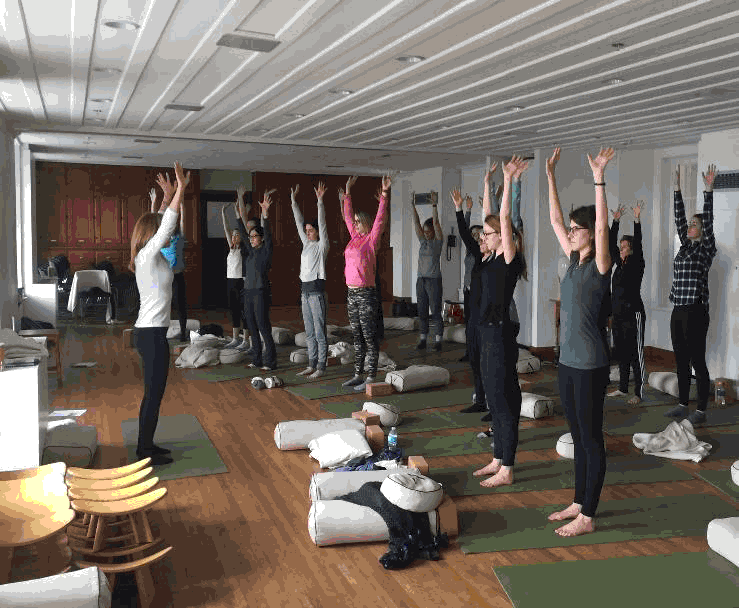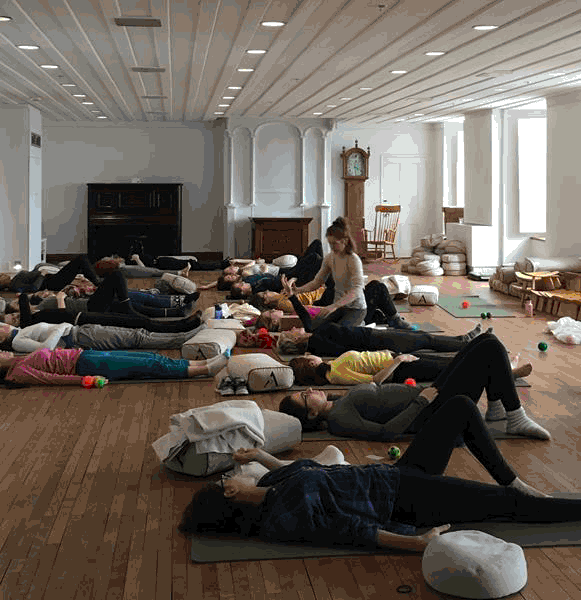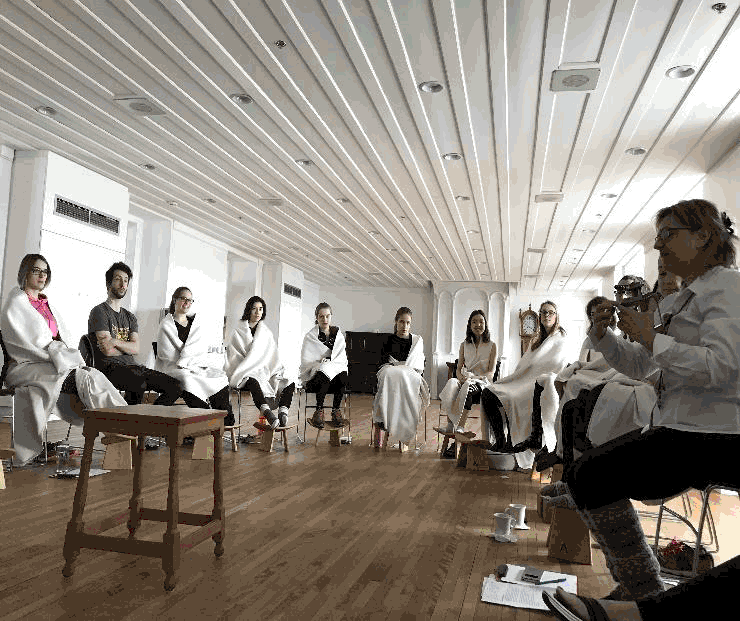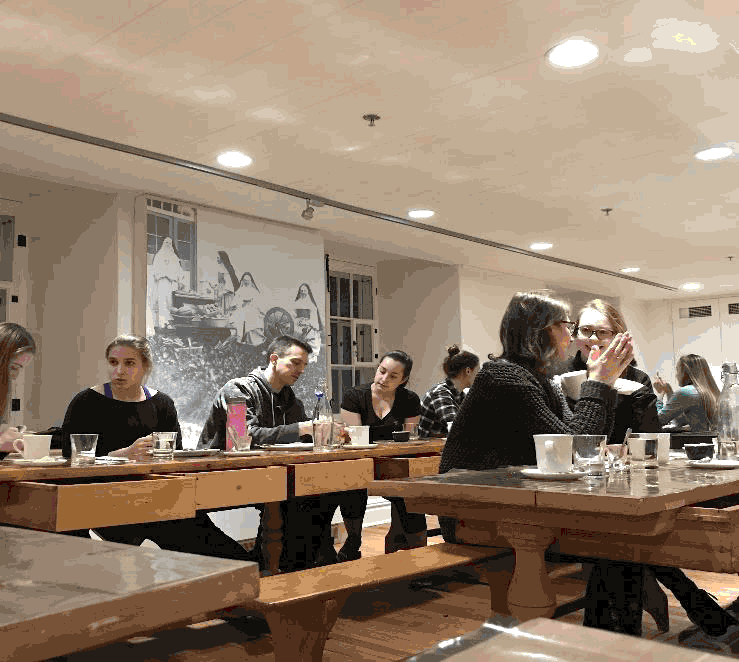Yoga Exercises during a Wellness Retreat for Students of Peer-Support Groups within the Historic Monastère Des Augustines (Québec City, Canada)

Joanie Mélançon1, Laurence Petitclerc1, Alexandre Lafleur1, Andrée Vézina1
doi: http://dx.doi.org/10.5195/ijms.2018.340
Volume 6, Number 3: 123-125
Received 14 12 2018: Accepted 23 12 2018
Students in health sciences are at higher risk of burnout and depression when compared with population controls.1 Dedicated to change this situation, the student community and faculty members of our institution are united to improve the global health of all trainees. Working under the Office of Student Affairs, our peer support groups at Laval University Faculty of Medicine provide personal and group support to more than three thousand students in health sciences.
We know from the literature that relying on peer support and engaging in wellness activities are useful coping mechanisms.2-5 But before helping other students, you must have the habits and tools necessary to be healthy and resilient in your own life. With that in mind, the Office of Student Affairs organised a three-day wellness retreat for students of peer support groups. The twenty participants were undergraduate students in medicine and physical rehabilitation, and graduate students in health sciences research. We slept in a contemporary centre of holistic health within the historic Monastère des Augustines (Québec, Canada). The program’s goals were to experience a wide range of wellness activities, reflect on global health habits, engage in interdisciplinary networking and cultivate peer support skills.
The retreat was an opportunity to experience various ways to be more relaxed, more centered and to attain better physical and mental health. Divided into one-hour sessions, the group participated in mindfulness meditation, breathing exercises, singing bowls and hand pan concerts, yoga, and self-massage with therapeutic balls and tai chi (Figure 1 and Figure 2). We asked professional trainers for advice, in particular on how to introduce these activities to our peers. Group discussions and reflexive activities focused on caregivers’ roles and how to implement lasting changes in students’ life habits (Figure 3).
Figure 1.Yoga Exercises during a Wellness Retreat for Students of Peer-Support Groups within the Historic Monastère Des Augustines (Québec City, Canada)

Students Discovered New Relaxation Exercises that They Would Not Have Thought of, Like this Activity with Therapeutic Balls.

Group Discussions on Caregivers’ Roles and Challenges Took Place in a Respectful and Supportive Climate.

The location of the retreat grearly contributed to its success. The Monastère is the restored former cloister of the Augustinian Sisters. While the activities encouraged spirituality, no form of worship was offered. Interestingly, the building is adjacent to l’Hôtel-Dieu de Québec where the sisters provided care, and it has become a major teaching hospital in which we have clinical rotations.
Having the opportunity to sleep onsite helped us to focus on our objectives. We had limited access to electronic devices. The environment was calm and serene. The meals were prepared with local and organic food, and we were invited to participate in mindful eating (Figure 4). Everything about this place was healthy, which led us to reflect on how our own daily habits can contribute to our wellbeing.
Figure 4.Students Were Invited to Participate in Mindful Eating, Revisiting Healthy Habits Like Sitting with Friends to Eat Meals Made with Organic Fruits and Vegetables.

We collected qualitative data through a group interview and written comments at the end of the retreat. The group was made up mainly of women, since 75% of the students enrolled in health sciences programs at our institution are females. Our colleagues commented on the importance of having this dedicated time for wellness activities and reflection. They appreciated that faculty leaders cared about their wellbeing and organised this retreat with enlightening new activities that they would not have thought of. While students are highly dedicated to helping others, they often forget to take care of their own wellbeing. They discovered simple relaxation techniques that they hope to share with students experiencing difficulty. The schedule facilitated rest and health habits that they wish to pursue. Through reflexive activities, sharing common goals and values as caregivers, the participants strengthened their group spirit. They were able to better articulate why they want to pursue their training in health sciences and guide their peers to do the same. Interdisciplinarity was highlighted as a key aspect of the retreat. It reminded the participants that most students of health sciences face similar challenges that could be tackled effectively with a collaborative approach.
We believe that some aspects of this retreat can be inspiring to other students around the world. We believe that students of peer-support groups represent a major asset for student affairs offices.3, 6-9 Given the large cohorts of students in health sciences, selecting the students of peer support groups for a retreat is a resource-effective way to disseminate those interventions within the student community. Finding a location that offered a calm and healthy environment and a large choice of activities certainly enriched the experience. Inviting support groups from many programs lead to rich, interdisciplinary discussions.
To be involved in a peer-support group requires active listening, empathy, generosity, altruism, optimism, resourcefulness and recognition of our limits. Knowing our own difficulties allows us to connect more easily with our colleagues. We are breaking the misconception that caregivers are immune to physical and mental health problems. We think we can change the way students view their difficulties, help them to manage their stress, and eventually overcome their problems. Helping our colleagues has become part of our training, motivating us even more to help our future patients.
We would like to thank Mrs Madeleine Moreau, Mrs Melissa Lenghan, Mrs Jeanne Francke, Sister Lise Tanguay and all personnel members of the Monastère des Augustines de Québec for their support and hospitality. We also would like to thank the Direction des Affaires Étudiantes and Direction des Communications et de la Philanthropie de la Faculté de Médecine de l’Université Laval for initiating and organizing this project. This article was written with the academic support of the QMA-CMA-MD Educational Leadership Chair in Health Professions Education at Université Laval.
The authors declare they have no competing interests.
Conceptualization: JM, LP, AL, and AV. Methodology: JM, LP, AL, and AV. Validation: JM, LP, AL, and AV. Formal Analysis: JM, LP, AL, and AV. Data Curation: JM, LP, AL, and AV. Investigation: JM, LP, AL, and AV. Writing – Original Draft: JM, LP, AL, and AV. Writing – Review & Editing: JM, LP, AL, and AV. Visualization: JM, LP, AL, and AV.
1.Dyrbye LN, West CP, Satele D, Boone S, Tan L, Sloan J, . Burnout among U.S. medical students, residents, and early career physicians relative to the general U.S. population. Acad Med. 2014 Mar;89(3):443–51.
2.Lee J, Graham AV. Students' perception of medical school stress and their evaluation of a wellness elective. Med Educ. 2001 Jul;35(7):652–9.
3.Shiralkar MT, Harris TB, Eddins-Folensbee FF, Coverdale JH. A systematic review of stress-management programs for medical students. Acad Psychiatr. 2013 May 1;37(3):158–64.
4.Dyrbye L, Shanafelt T. A narrative review on burnout experienced by medical students and residents. Med Educ. 2016 Jan;50(1):132–49.
5.Redwood SK, Pollak MH. Student-led stress management program for first-year medical students. Teach Learn Med. 2007 Winter;19(1):42–6.
6.Sawyer SI, Sylvestre PB, Girard RA, Snow MH. Effects of supplemental instruction on mean test scores and failure tates in medical school courses. Acad Med. 1996 Dec;11(12):1357–9.
7.Strayhorn G. A pre-admission program for underrepresented minority and disadvantaged students: Application, acceptance, graduation rates, and timeliness of graduating from medical school. Acad Med. 2000 Apr;75(4):355–61.
8.Suranjana RA, Ujjani R, Kami RM. Peer Tutoring as a Remedial Measure for Slow Learners in a Medical School. Journal of Krishna Institute of Medical Sciences University. 2015; 4(1): 130–4.
9.DeVoe P, Niles C, Andrews N, Benjamin A, Blacklock L, Brainard A, . Lessons learned from a study-group pilot program for medical students perceived to be ‘at risk'. Med Teach. 2007 Mar;29(2-3):e37–e40.
Joanie Mélançon, 1 Faculty of Medicine, Laval University, Québec, Canada
Laurence Petitclerc, 1 Faculty of Medicine, Laval University, Québec, Canada
Alexandre Lafleur, 1 Faculty of Medicine, Laval University, Québec, Canada
Andrée Vézina, 1 Faculty of Medicine, Laval University, Québec, Canada
Mihnea-Alexandru Găman, Editor
About the Author: joanie Mélançon is currently a jourth year medical student at Laval University, Quebec city, Canada. She is a recipient of the Mach-Caensslen Foundation of Canada Study Grant for her research in prenatal stress and its impact on birth weight. Laurence Petitclerc is a a fourth year student in physiotherapy at Laval University. She received the Physiotherapy Student Association Scholarship rewarding the student who has been most involved during his physiotherapy studies and the Desjardins Scholarship at Laval University for the social activities organization she held for the rehabilitation student peer-support group, joanie and Laurence are respectively the leaders of the student peer-support groups for medicine and physical rehabilitation programs at Laval University Faculty of Medicine.
Correspondence: Assist. Prof. Alexandre Lafleur, MD, MSc, Address: Faculty of Medicine, Laval University, Québec, Canada. Email: alexandre,lafleur@fmed.ulaval.ca
Cite as: Mélancon J, Petitclerc L, Lafleur A, Vézina A. Put Your Mask On First Before Assisting Others! A Wellness Retreat for Students of Peer Support Groups. Int J Med Students. 2018 Sep-Dec;6(3):123-125.
Copyright © 2018 Joanie Mélançon, Laurence Petitclerc, Alexandre Lafleur, Andrée Vézina
This work is licensed under a Creative Commons Attribution 4.0 International License.
International Journal of Medical Students, VOLUME 6, NUMBER 3, December 2018